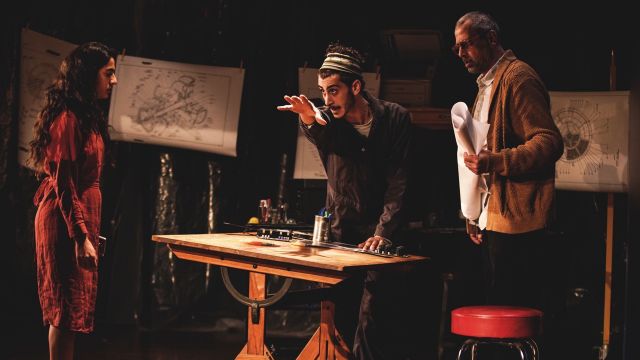Grey Rock
The ‘grey rock’ is the Moon. In a West Bank, Palestine, villageYusuf (Khalifa Natour), a widowed and retired television repairman, is building a rocket to go there. He’s already done time for being a troublemaker. He keeps his project secret from his daughter Lila (Fidaa Zaidan) and definitely from Lila’s fiancé, play-it-safe Jawad (Alaa Shehada). But he sees that he needs the help – if not the blessing – of the village imam, Sheik (Motaz Malhees). Yusef is so intent – if not obsessed with – his plan, he is selling off his family’s land to finance it. Meanwhile, a bright and nosy young man, Fadel (Ivan Azazian) is hanging around because he’s always been in love with Lila and he twigs Yusef’s plan. Yusef, reluctantly at first, recruits him as an assistant. Thus Fadel becomes Jawad’s rival as well – a situation in which Yusef is happy to meddle…
I am possibly too literal minded here, but for me a large credibility problem hangs over the story. I could not believe that a television repairman could build a rocket in his backyard shed capable of even blasting off with him aboard, let alone of taking him to the Moon. As for concealing it by the minaret of the village mosque, well, there we go even further. Given that the characters and the story that surround this enterprise are more or less naturalistic, the rocket to the moon – the sine qua non of the play – feels surreal – unless we rationalise it and say Yusef is mad or has been driven mad by his circumstances such as the death of his beloved wife. But three other characters go along with it, so… The play is neither allegory or social realism.
 The play has been developed in Palestine, but so far has only been performed in English, premiering at New York’s La Mama. So… Might the play be a more viable work if the Palestinian cast had spoken their own language? Yes – but perhaps not that much. Uncertainty and stressful concentration would be gone and there would be more nuance, warmth and humour. But that would not have done the English-speaking audience much good – and the play itself would unfortunately still be burdened with its cliché characters and romance sub-plot, its repetitions, and its credibility problems. What draws audiences to this play is surely that it is a voice out of Palestine, a voice we don’t hear in the theatre and rarely in the cinema.
The play has been developed in Palestine, but so far has only been performed in English, premiering at New York’s La Mama. So… Might the play be a more viable work if the Palestinian cast had spoken their own language? Yes – but perhaps not that much. Uncertainty and stressful concentration would be gone and there would be more nuance, warmth and humour. But that would not have done the English-speaking audience much good – and the play itself would unfortunately still be burdened with its cliché characters and romance sub-plot, its repetitions, and its credibility problems. What draws audiences to this play is surely that it is a voice out of Palestine, a voice we don’t hear in the theatre and rarely in the cinema.
In an interview quoted in the program, Zuabi says he ‘wanted to keep away from the obvious political polemics’ – although there are passing references enough to the Israeli Army and ‘checkpoints’. However, given that Yusef is the only rounded character (an engaging performance too from Khalifa Natour), when he argues for his crazy plan, we pay attention. It is his motives for building his rocket – those he states and the extreme and hugely expensive, destructive and selfish one revealed at the climax - that are the power of the text. The silly love story and the rather easily convinced imam are the comic sugar on the pill of Palestinian frustration and thwarted aspirations.
Michael Brindley
Photographer: Carlos Cardona
Subscribe to our E-Newsletter, buy our latest print edition or find a Performing Arts book at Book Nook.

